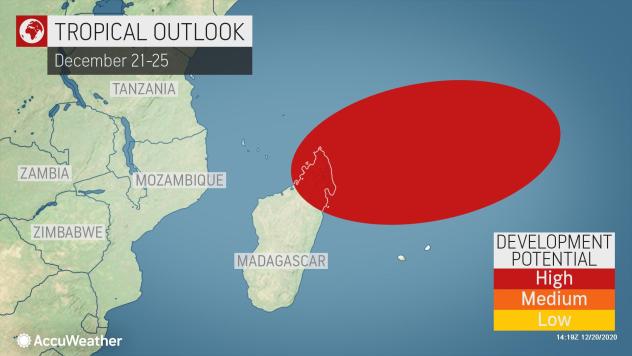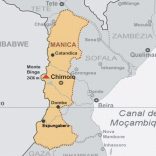Mozambique: Product shortages in Tete supermarkets
Potential tropical system to take aim at Madagascar late this week, “may eventually emerge over the Mozambique Channel early next week”

Image: Twitter / @breakingweather
As activity in the South Pacific Ocean and West Pacific Ocean basins continue to heat up, the Indian Ocean basin refuse to be left behind. The necessary atmospheric ingredients will likely come together this week to allow a tropical system to form in the southwestern Indian Ocean.
“A tropical low located well southwest of Diego Garcia will continue to strengthen as it drifts westward over the next few days,” AccuWeather Senior Meteorologist Jason Nicholls said.
Vertical wind shear, which is the change in direction and speed of winds at increasing heights in the atmosphere, is forecast to remain low across the southwestern Indian Ocean throughout the week.
“Warm water and favourable atmospheric conditions are expected to allow this low to strengthen into Tropical Storm Chalane this week,” Nicholls explained.
As this tropical low slowly drifts westward, it will enter an area of atmospheric conditions that will likely allow for further strengthening.
To strengthen, tropical systems need at least two main atmospheric ingredients — high sea-surface temperatures and low levels of vertical wind shear.
As the storm strengthens, it will continue to track slowly westward throughout much of this week.
The tropical low likely to be named Chalane can strengthen enough to achieve moderate tropical-storm status, as designated by Météo France’s La Réunion, later this week, Nicholls noted.
As the storm approaches northern Madagascar late this week, periods of tropical rainfall, gusty winds and rough seas will begin to increase across the region.
“The storm is expected to strike northeast Madagascar on Saturday and may eventually emerge over the Mozambique Channel early next week, local time,” Nicholls said.
The tropical low likely to be named Chalane can strengthen enough to achieve moderate tropical-storm status, as designated by Météo France’s La Réunion, later this week: https://t.co/rYsKRCV5s0 pic.twitter.com/dTqEaV9KM3
— AccuWeather (@breakingweather) December 21, 2020
A developing tropical low northeast of the #Mascarene Islands is expected to become Moderate TS #Chalane over the next few days. Storm is expected to move across northern #Madagascar next weekend. Low can enter the #Mozambique Channel around the 28th or 29th. pic.twitter.com/11dTwgjtyx
— Jason Nicholls (@jnmet) December 20, 2020
The heaviest rains from the storm will impact much of northern Madagascar from Saturday through Monday. A general 100-200 mm (4-8 inches) of rainfall is expected to deluge much of northern Madagascar and the country’s eastern coast after the system makes landfall and slowly tracks west.
Rainfall of this magnitude will likely lead to flooding issues for the region and will also increase the threat for mudslides.
A majority of the heaviest rainfall from this event is set to occur north of the capital city of Antananarivo, but any brief tropical downpours may lead to flash flooding concerns for the region.
In addition to heavy rain, gusty winds can lead to wind damage and power outages for portions of Madagascar, especially near where the system makes landfall on Saturday.
This potential tropical system will likely be the third named tropical system of the season for the South-West Indian Ocean basin and will likely be the first of the season to make landfall in the basin.
Zone of disturbed weather has been declared northeast of the #Mascarene Islands and is expected to become Moderate TS #Chalane around Thursday, local time. Storm can strike northern #Madagascar around Sunday. pic.twitter.com/s4BgJra3ig
— Jason Nicholls (@jnmet) December 21, 2020
The 2020 South-West Indian Ocean basin cyclone season officially began on 15 Nov. and will end on 30 April 2021. There have been two named tropical systems so far this season: Tropical Cyclone Alicia and Severe Tropical Storm Bongoyo. Alicia churned in the basin from 12 Nov. to 17 Nov. while Bongoyo was in the basin from 30 Nov. to 11 Dec. Both systems remained over the open waters of the Indian Ocean during their respective lifetimes.












Leave a Reply
Be the First to Comment!
You must be logged in to post a comment.
You must be logged in to post a comment.